Mediterranean Diet Snacks: Best Practices

At Healthy Tips You Blog, we believe in the power of nutrition to transform our lives. The Mediterranean diet stands out for its remarkable health benefits and delicious flavors.
In this post, we’ll guide you through the best practices for choosing snacks that align with this wholesome eating pattern. Join us as we uncover tasty and nutritious snack options that fit perfectly into a Mediterranean lifestyle.
Understanding the Mediterranean Diet
The Mediterranean Diet is more than just a meal plan; it’s a pathway to better health through nutritious eating habits. Rooted in the dietary patterns of countries bordering the Mediterranean Sea, this diet is celebrated for its ability to promote longevity and prevent chronic diseases. Here, we’ll break down its fundamental principles, health benefits, and core foods to help you seamlessly incorporate it into your daily snack choices.

Timeless Principles for Modern Snacking
The Mediterranean Diet emphasizes whole foods, healthy fats, and lean proteins. It’s a testament to eating with intention and mindfulness, placing a strong emphasis on the quality and variety of ingredients. Snacks aren’t just about quelling hunger pangs—they’re an opportunity to nourish your body between meals. Hence, choosing snacks that align with these principles is key.
Unpacking the Health Benefits
Research consistently shows that following a Mediterranean Diet can lead to a reduced risk of heart disease, improved cholesterol levels, weight loss, and a decreased risk of developing Type 2 diabetes. It’s a powerful way to support your overall health, leveraging food as medicine. But it’s not just about what you avoid (like processed foods and excessive sugars); it’s equally about what you embrace—nutrient-rich fruits, vegetables, nuts, and seeds.

Core Ingredients for Snacking Success
Snacks on the Mediterranean Diet are vibrant and filled with nutrients. Here are some essential ingredients and foods to include:
-
Fruits and Vegetables: Fresh is best. Think about incorporating a variety of colors to get a wide range of nutrients.
-
Nuts and Seeds: Almonds, walnuts, and pumpkin seeds are excellent for a quick snack. They’re packed with healthy fats, protein, and fiber.
-
Whole Grains: Opt for whole-grain options like quinoa or whole-wheat crackers for added fiber.
-
Lean Proteins: Greek yogurt, hummus, or slices of turkey can provide you with necessary protein to keep you full longer.
-
Healthy Fats: Avocados and olives are great sources of healthy fats that can keep your hunger at bay.
Here are a few practical snack ideas to get started:
-
Vegetable sticks with hummus: A perfect blend of fiber and protein.
-
Greek yogurt with berries: Loaded with probiotics and antioxidants.
-
Whole wheat toast with avocado: A satisfying snack rich in fiber and healthy fats.
By choosing snacks packed with these ingredients, you’re not only adhering to the Mediterranean Diet but also taking steps towards a healthier lifestyle. For those looking to dive deeper into Mediterranean diet meals, consider exploring our guides, such as the Mediterranean Diet 101 or for specific benefits, our article on Olive Oil Benefits could be insightful.
Remember, the goal is to enjoy a variety of foods that not only taste good but also do good for your body. Make every bite count by choosing snacks that support your health and align with the venerable wisdom of the Mediterranean Diet.
Smart Snacking on the Mediterranean Diet
Eating smart on the Mediterranean Diet means more than just picking the right foods; it’s about how, when, and how much you eat. Let’s dive into the practicalities of snacking the Mediterranean way – focusing on whole foods, managing portions, and optimizing timing to enrich your diet without compromising on taste or nutrition.
Embrace Whole Foods for Every Snack
Whole foods are the cornerstone of the Mediterranean diet. Snacks should be no exception. Processed foods often contain added sugars, unhealthy fats, and excess sodium, which can undermine the health benefits of the Mediterranean lifestyle. Instead, focus on snacks that harness the natural goodness of whole ingredients. For instance, a simple handful of nuts or sliced fruits can be both satisfying and nutrient-dense.
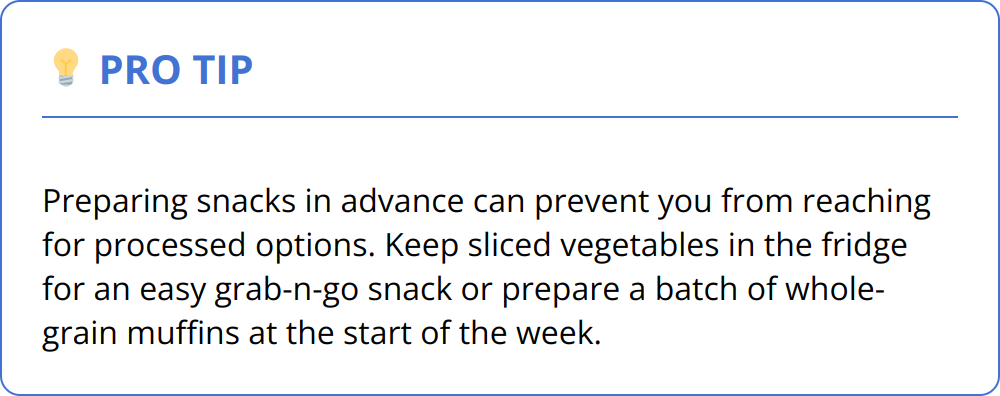
Portion Control: Balance is Key
Portion control is essential, even for the healthiest of snacks. The Mediterranean diet emphasizes moderation and balance, ensuring you’re getting just enough to satisfy hunger without overeating. Eating directly from a large bag or container makes it all too easy to consume more than intended. Instead, portion out snacks into individual servings.
A few practical examples include:
-
A small bowl of olives instead of eating straight from the jar.
-
Pre-measuring a serving of nuts, rather than consuming them out of the bag.
-
Using smaller plates or bowls for snacks like yogurt or salads.
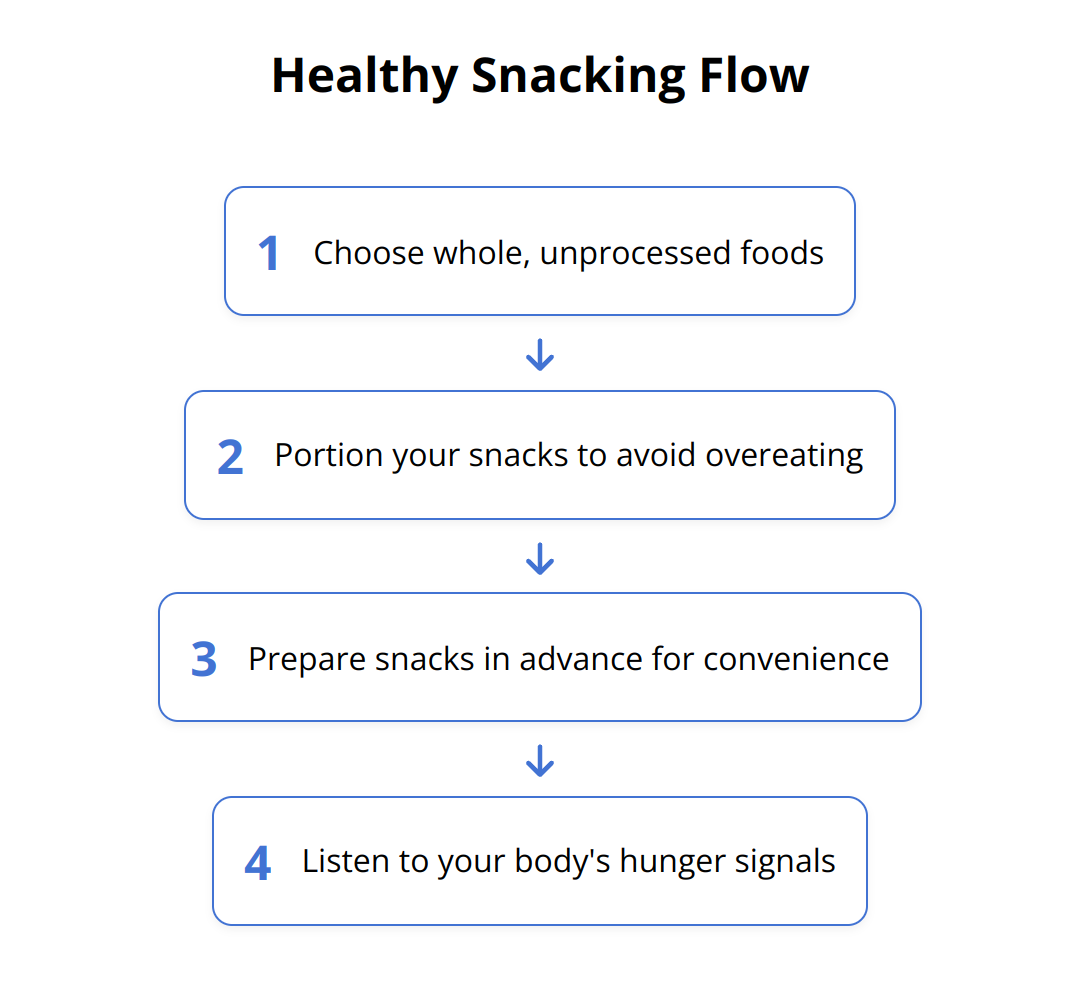
Timing Matters: Listen to Your Body
The frequency and timing of snacks can significantly influence your energy levels and overall health. Snacking isn’t just about the clock; it’s about listening to your body’s hunger cues. Incorporating a mid-morning or afternoon snack can help maintain steady energy levels throughout the day, preventing overeating at meal times.
Consider these guidelines:
-
Aim for a snack when there’s a long gap between meals to keep your metabolism active.
-
Opt for a protein-rich snack like Greek yogurt or a small portion of cheese after a workout to aid in muscle recovery.
-
If you find yourself hungry late at night, choose something light and nourishing, such as a piece of fruit or a small handful of nuts, to avoid disrupting your sleep.
In conclusion, smart snacking on the Mediterranean Diet isn’t just about what you eat but also how and when you eat. By focusing on whole foods, practicing portion control, and timing your snacks wisely, you can enjoy delicious, healthful snacks that perfectly complement the Mediterranean lifestyle. For further reading, our guide on healthy eating habits provides more insightful tips on maintaining a balanced diet.
Elevate Your Snacks
When transitioning to a Mediterranean diet, snacks become more than just a mid-day pick-me-up; they evolve into a crucial component of your overall nutritional strategy. Emphasizing whole foods, lean proteins, and healthy fats does not only align with Mediterranean principles but also ensures that every bite contributes to your health. Let’s explore how to elevate your snack game with combinations that are both delicious and nutritious.
Fruit and Nut Power Combos
Fruits and nuts are staples of the Mediterranean diet, known for their health benefits and ease of snacking. Combining them can create a powerful snack that’s both satisfying and beneficial. For example, pairing apple slices with almond butter offers a mix of sweet and savory flavors, along with a good balance of fiber, healthy fats, and protein. Other winning combinations include:
-
Pears and walnuts for a crunchy and juicy snack.
-
Dates stuffed with pistachios for a naturally sweet treat packed with antioxidants.
-
Berries and almonds for a low-calorie option rich in vitamins and minerals.
These combinations are not only tasty but also help in controlling hunger, boosting energy levels, and providing a wide range of nutrients.
Veggie and Dip Delights
Vegetables are the backbone of the Mediterranean diet, and when paired with the right dips, they make for a crunchy and refreshing snack. Hummus, made from chickpeas, olive oil, and garlic, is a classic choice that pairs well with almost any vegetable. Bell pepper strips, carrot sticks, and cucumber slices are excellent vehicles for this protein-rich dip.
Another great option is tzatziki, a yogurt-based dip that’s both cooling and flavorful, perfect for those warmer months. Try these vegetable and dip pairings for a satisfying snack:
-
Cherry tomatoes and baba ganoush, a rich, smoky eggplant dip.
-
Snap peas and tzatziki for a refreshing and crisp bite.
-
Broccoli and hummus for a fiber-rich, filling option.
Remember, these dips can also serve as flavorful spreads on whole grain crackers or bread for added variety.
Whole Grain and Lean Protein Pairings
Whole grains provide essential fiber, which, when combined with lean proteins, can help keep you feeling full and energized longer. A classic Mediterranean snack is whole wheat pita bread paired with a slice of low-fat cheese or a smear of hummus. This combination not only tastes great but also provides a balanced mix of macronutrients.
Quinoa salads topped with grilled chicken or tuna are another excellent snack option, offering a hearty dose of protein alongside the numerous health benefits of whole grains. Here are a few more recommendations:
-
Brown rice cakes topped with avocado and smoked salmon
-
Barley salad with feta cheese and cherry tomatoes
-
Whole grain toast with ricotta cheese and figs
These snack ideas are not just about sticking to diet principles; they’re about enjoying what you eat while nurturing your body. The Mediterranean diet, rich in fruits, vegetables, whole grains, nuts, seeds, and lean proteins, offers endless possibilities to mix and match for your snack time.
For more inspiration on incorporating these principles into every meal, check out our guide to healthy eating habits. Remember, the key to a successful Mediterranean diet is variety, balance, and the enjoyment of food as a way to nourish the body and soul.
Wrapping Up
Incorporating healthy snacks into your diet is more than just a strategy for managing hunger—it’s about enriching your lifestyle with flavors and nutrients that foster long-term health and vitality. Embracing the Mediterranean diet, with its heart-healthy fats, lean proteins, and an abundance of plant-based foods, not only supports cardiovascular health but also enhances overall well-being. The beauty of this diet lies not just in its nutritional benefits but in its diversity and adaptability to different tastes and preferences.
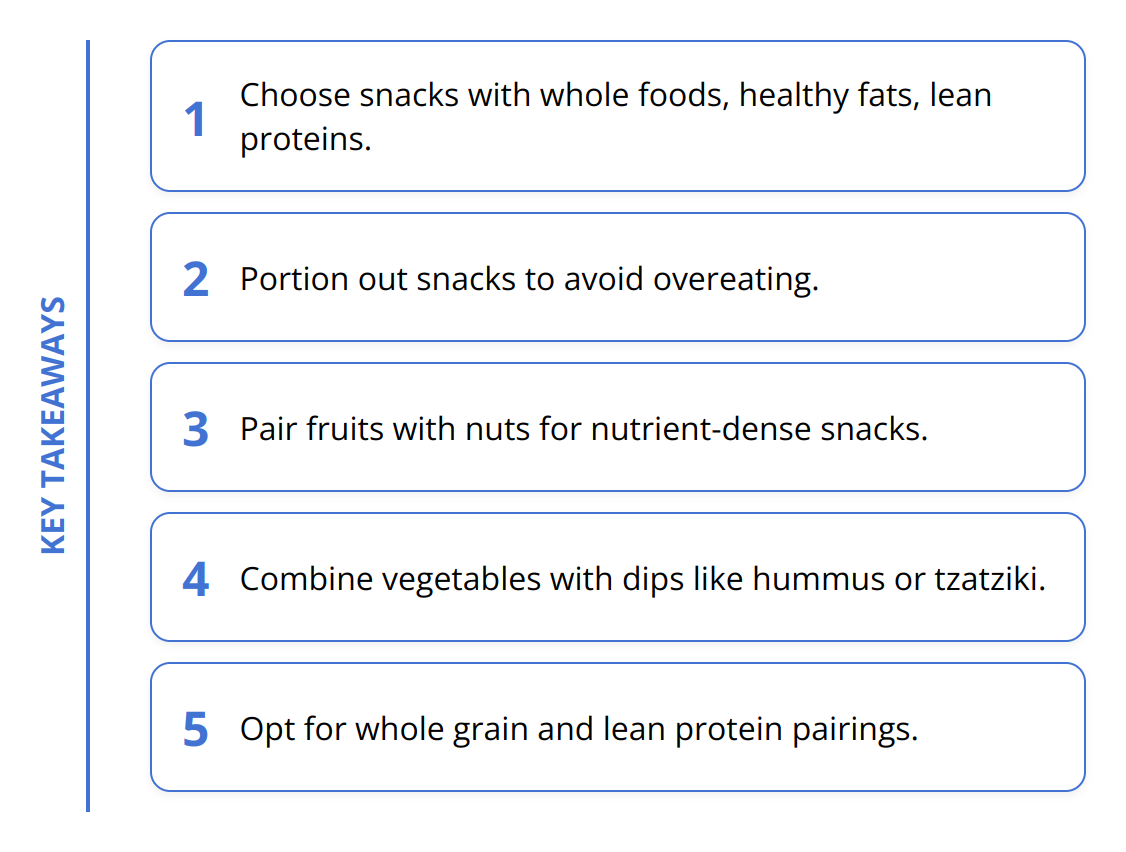
We at Healthy Tips You Blog encourage you to explore and experiment with the vast array of snack options available within the Mediterranean diet framework. The combination of whole foods and mindful eating practices offers a sustainable path to enjoying food while nurturing your body. Let the colors, textures, and flavors inspire you to create snacks that are not only healthy but also enjoyable and satisfying. Remember, the key to a successful dietary habit is finding joy in the foods you eat and making them a part of your daily routine.
Let this journey not be one of restriction but one of discovery. Sustainability comes from balance and enjoyment—finding those snacks that you look forward to, that satisfy your cravings, and that fit seamlessly into your life. As you incorporate these nutritious snacks into your diet, celebrate the small victories, whether it’s choosing a fruit over a processed sweet or finding a new vegetable you love.
For more insights into making the Mediterranean diet a lasting part of your lifestyle, visit Healthy Tips You Blog. Here, you’ll find a treasure trove of resources, from detailed meal plans to enlightening articles, all designed to help you achieve a balanced, healthful way of eating.
Remember, the journey to better health is ongoing. It’s about making informed choices, one snack at a time, and relishing the vibrant, fresh, and delicious options that the Mediterranean diet offers.

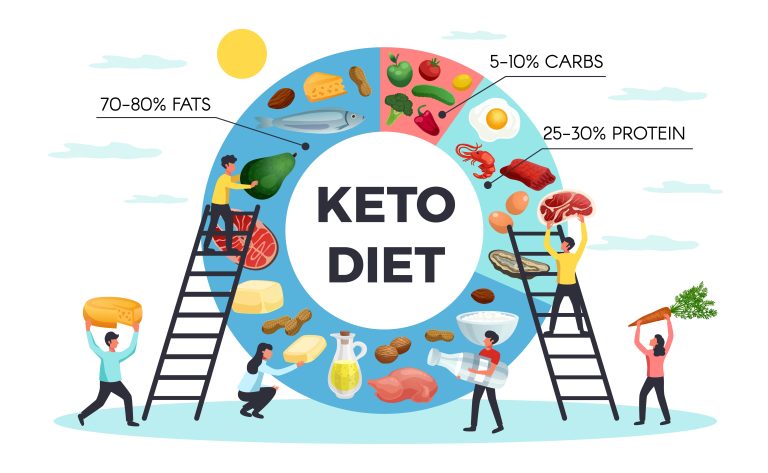




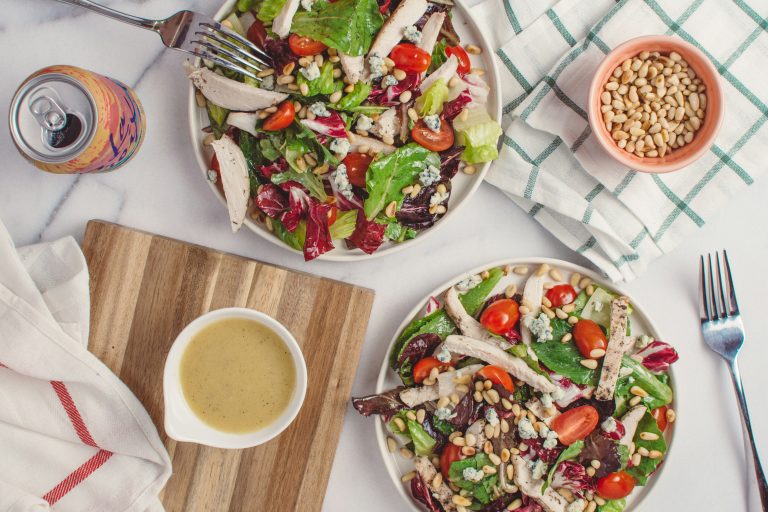
One Comment